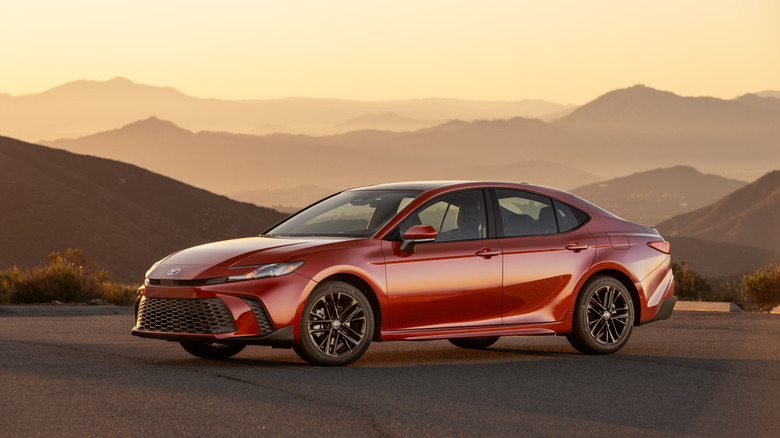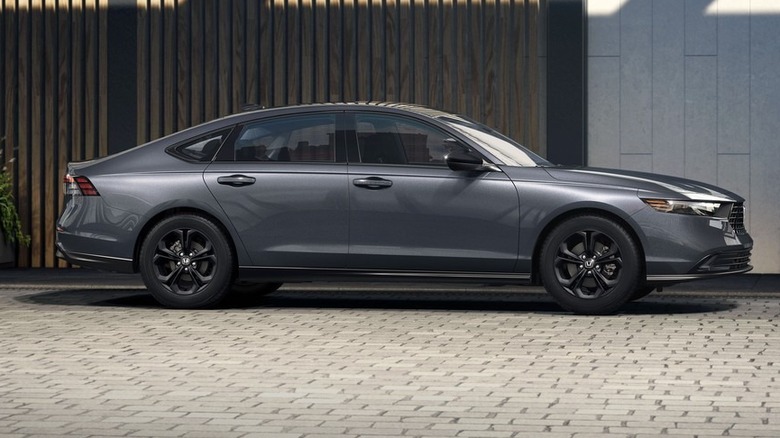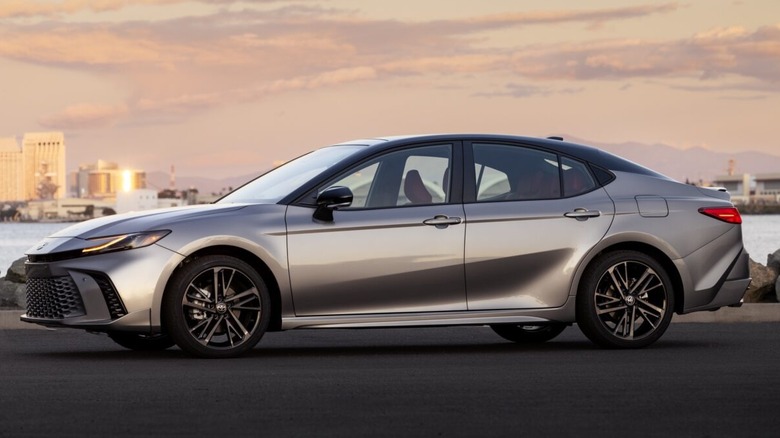Toyota Camry Vs Honda Accord: Which Is Bigger & What's The Price Difference?
If you're in the market for a new mid-size sedan, two of your best options would naturally be the top two best-selling vehicles in the category: the Toyota Camry and the Honda Accord. While the Camry topped the list for the best-selling mid-size sedan in 2025, the Accord came out on top on Car and Driver's list in the same year. The battle between the Camry and the Accord for mid-size dominance has been going on for the past four decades, with the roots of this legendary rivalry tracing back to 1976 when Honda debuted the Accord.
The Accord ended up being a major success for Honda, prompting Toyota to launch a rival, the Camry, in 1982. From that moment on, the two have been locked in a constant battle for the attention of American buyers. Considering these cars are still selling in good numbers, the rivalry is likely to continue for the foreseeable future. Interestingly, while both the Honda Accord and Toyota Camry fall firmly in the mid-size category — thereby being similar in overall dimensions — there are subtle differences in their size as well as their prices. There are now many generations of the Honda Accord and the Toyota Camry, with plenty of years to avoid if you're looking to buy. We even did a head-to-head comparison in our review of the 2018 models. However, here we will focus on the latest models from the two brands.
The Honda Accord is (slightly) bigger
As of this writing, Honda had not released all of the details of its 2026 Accord model, but from what we do know, the 2026 Accord is the larger vehicle, albeit by a small margin. It is the longer of the two, stretching 195.7 inches bumper to bumper, compared to the 2026 Camry's 193.5 inches. Similarly, the Accord is slightly wider at 73.3 inches, compared to the Camry's 72.4 inches. As for truck space, the 2025 Accord's trunk can gobble up 16.7 cubic feet of cargo, which is also slightly more than the Camry's 15.1 cubic feet.
Once you get inside these vehicles, however, that's when the size differences between the two become more pronounced. Take the passenger volume metric as an example. The larger size of the 2025 Accord ensures that it gets 105.7 cubic feet of passenger volume in its base model. The numbers are slightly lower in other trims at 102.8 cubic feet. In comparison, the Camry maxes out at 99.9 cubic feet. It's a similar story when it comes to other metrics like overall legroom and trunk space. The Accord offers 40.8 inches of leg room in the rear seats, compared to the Camry's 38 inches.
These may look like small numerical differences, but for families or long-distance travelers, every extra inch counts. If your primary focus is to buy the bigger of these two vehicles, the Honda Accord is your better option. Then again, a major purchase decision like this shouldn't just be based on a single metric. Let's take a quick look at how these cars fare in other aspects like engine options and pricing.
The Toyota Camry's simplest trim is more expensive
While the Honda Accord has more trim options, the Toyota Camry has the capacity for more power. Toyota offers the 2026 Camry in five trims (LE, SE, Nightshade, XLE, and XSE). All variants feature a 2.5-liter four-cylinder engine mated to a hybrid system capable of producing 232 horsepower. In contrast, the latest generation of the Honda Accord comes in six trims (LX, SE, Sport Hybrid, EX-L Hybrid, Sport-L Hybrid, and Touring Hybrid). The two base variants (LX and SE) deliver 192 horsepower at 6,000 rpm and use a conventional gas engine. Step up into the Sport Hybrid, EX-L Hybrid, Sport-L Hybrid, or Touring Hybrid models, however, and you're met with a 204-horsepower hybrid system.
As for the pricing, the base variant of the Toyota Camry (LE) starts at $29,000, which is slightly higher than the base Honda Accord trim (LX), which starts at $28,295. The SE trim of the Camry is slightly pricier at $31,300 and is on par with the Accord SE, which costs $30,560. The Nightshade option of the Toyota Camry, which is new in its 2026 offerings, starts at $33,825. Pricing for the higher-end XLE and XSE trims of the Camry start at $35,525 and $36,725, respectively. As for the Hybrid Accords, pricing for the base Sport Hybrid variant starts at $33,655, going up to $34,940 for the EX-L Hybrid, $35,375 for the Sport-L Hybrid, and $39,300 for the Touring Hybrid variant. What is interesting about the pricing is that while the top-end Toyota Camry XSE maxes out at $34,900, Honda's Touring Hybrid is considerably more expensive at $39,300.


